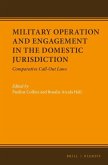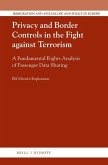This volume offers an evaluation of the Schengen Information System and border control co-operation from a transparency and proportionality perspective. It also incorporates a legal descriptive analysis of the co-operation in order to accommodate the changes and developments that occurred during the writing period. The transparency and proportionality perspectives are developed from human rights and data protection criteria. Transparency is understood as knowledge and accessibility to legal information as well as openness and accountability. On the other hand, proportionality is a requirement for guidance, balance and justification as well as a need to avoid excessiveness and arbitrariness in border control work. The final findings reveal that the Schengen co-operation suffers from a deficiency of transparency and proportionality. Consequently, measures are proposed to augment the deficiency. Even as this study was reaching its conclusion, fundamental legislative changes, closely similar to some of the arguments and recommendations projected in this study, took place. The efficacy of these changes is yet to be discerned.
Hinweis: Dieser Artikel kann nur an eine deutsche Lieferadresse ausgeliefert werden.
Hinweis: Dieser Artikel kann nur an eine deutsche Lieferadresse ausgeliefert werden.








